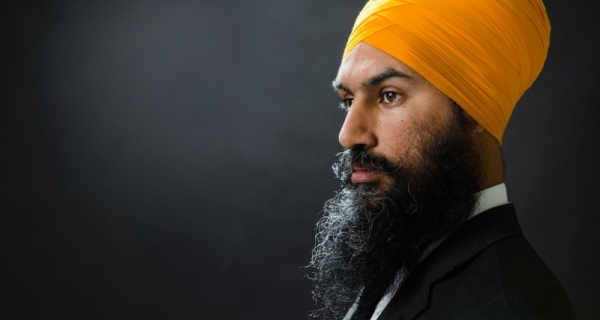The New Democratic Party (NDP) has been in hibernation since the last federal election. It shed several pounds in Parliament—from 103 to 44 seats after the 2015 election—and ran its it’s base’s enthusiasm enthusiasm dry, leaving a skeleton of good policy remaining but little charisma.
In this weak position, the NDP took its biggest gamble yet. Its members elected Jagmeet Singh—a charismatic, fashionable knight in a three-piece suit of armour—as their federal leader. This was a momentous occasion in Canadian history, as Singh became the first non-white leader of a major political party. And Singh didn’t win by a small margin: He received 53.8 per cent of the vote, winning on the first ballot—a feat matched only by Jack Layton and Tommy Douglas.
In addition to being a young up-and-comer from Ontario, Singh is also a practicing Sikh, who proudly wears a brightly-coloured turban and carries a kirpan by his side. Many Quebecois—on both sides of the political spectrum—seem to take issue with that. For example, Longueuil-Saint-Hubert NDP member of parliament (MP) Pierre Nantel recently expressed his belief that Singh’s turban and kirpan were incompatible with what Quebecers expect of their public leaders. Of course, government institutions cannot discriminate against citizens or confer certain advantages based on religious belief. This doesn’t mean, however, that government officials cannot hold religious beliefs themselves—just that those beliefs cannot influence their public policy.
Nantel’s comments come from a widely held—and indeed legislated—Quebecois belief that church and state should be separate. But, in questioning the ability of privately religious individuals to hold public positions of power, Nantel and a growing minority of Quebecois terribly misinterpret the meaning of these laws, which originate from Quebec’s strong secularist values. This rhetoric is dangerous, as it only inflames existing racial and ethnic tensions in this province.
Singh is entitled to practice his religion while in public office. The only requirement is that government institutions under his oversight cannot discriminate against people who have different religious beliefs than he has. Singh is not looking to marginalize anyone: His viral slogan is #LoveAndCourage.
Quebecers have a right to choose the candidate they deem the most fit to be party leader. If Singh’s turban gets in the way of his policies, then voters have the right to disregard his candidacy. But, Singh’s policies have nothing to do with religion; as a candidate, he ran on universal pharmacare and anti-climate change commitments. If the Quebecois reject Singh only because of his religion, it sends a message to all religious minorities in Quebec that don’t fully belong to the larger community or aren’t accepted in positions of power. In an age when identity politics seems to be the norm, this will have terrible ramifications for everyone.
Race relations have steadily worsened in Quebec over the past several years. In Quebec City, for instance, there were 113 hate crimes or suspected hate crimes reported for the first half of 2017, compared to the 137 hate crimes reported for all of 2016, according to the Montreal Gazette. The vast majority of hate crimes are directed at a religion, with race and ethnicity being the second greatest target. Even once-inclusive local politicians have become less tolerant, partly contributing to heightened racial tensions in the province. Following the stabbing of a Michigan police officer by a Montrealer allegedly shouting an Islamic phrase, Premier Philippe Couillard changed his supportive tone for Muslims. A CBC article quotes him saying, “Unfortunately, you cannot disconnect this type of event, terrorism, from Islam in general.”
If Singh’s candidacy stirs more controversy and hateful discussion in Quebec, then it will only contribute to existing feelings of marginalization held by visible minorities. Instead, Singh’s openness about his religion must promote a frank and positive discussion about race. Quebec has an opportunity to restore relations with marginalized communities throughout the province. But, this productive discussion only starts when Quebec acknowledges its problem with discrimination, rather than merely masking the issue under the guise of state secularism.
Singh’s nomination presents a real test for Quebec to stand by the diversity and inclusivity its citizens voted for theoretically with Justin Trudeau.
Jagmeet Singh deserves a fair shot. Let’s give him one.








